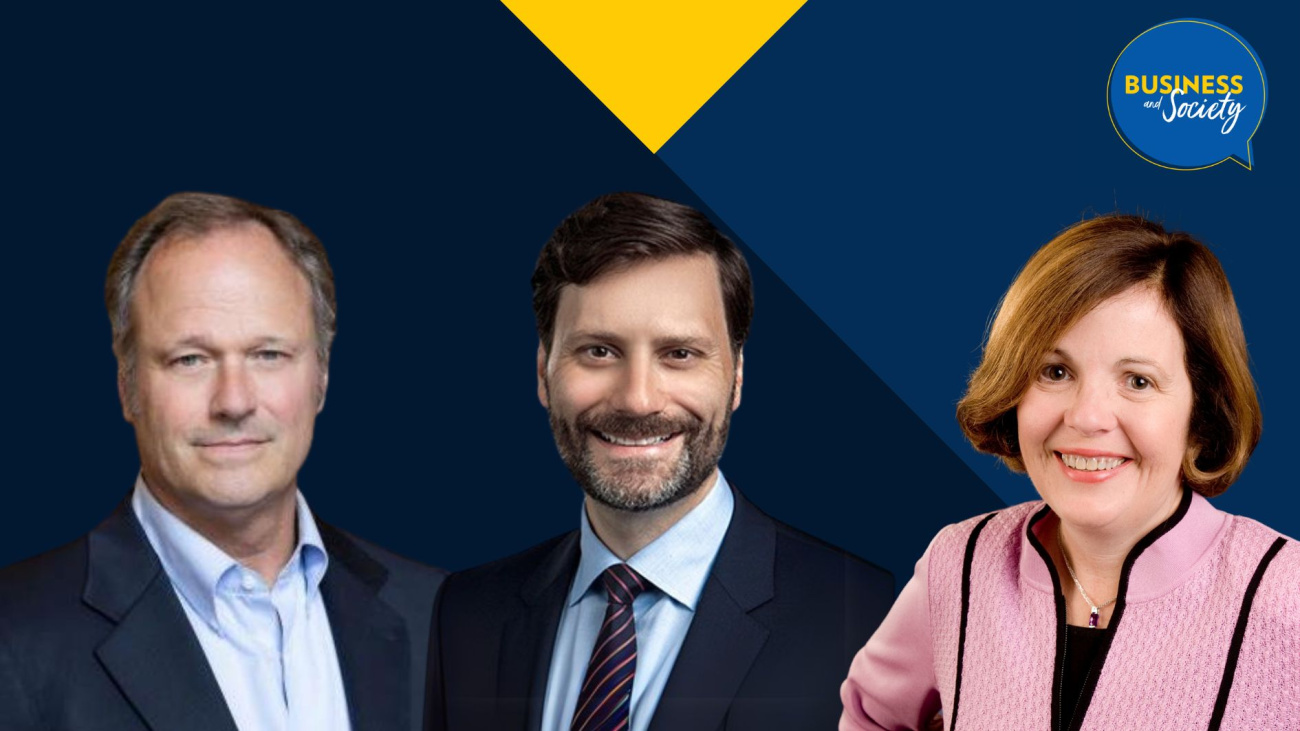News — Professors , , and join this episode of Business and Society to discuss their research and expertise on corporate governance — the systems and regulations that allow a company to operate with accountability, transparency, and fairness.
Insider Trading, Employment Mobility, and Climate Change
The conversation starts with a look into each Ross professor’s research as it relates to corporate governance. Schipani discusses insider trading, how it violates the fiduciary duties integral to corporate governance and harms shareholders, and the myriad of ways unethical trades go under the radar.
Bishara’s research focuses on employment contracts and mobility. He’s particularly interested in how disruptive forces like automation and artificial intelligence impact the future of work and how to ensure just transitions for workers.
Hoffman’s research is primarily focused on the ways the market can address issues like climate change. He seeks to understand the role of policy in driving sustainability efforts and the role of business in influencing such policy.
Business and Regulation
Public policy in corporate regulation can often be seen as burdensome to businesses. However, the panel explains that regulation of the business world is necessary for the sake of everyone, from consumers to business leaders, and can help level the playing field among companies.
“We had a lot of companies out there reducing their carbon footprint. That's all well and good,” Hoffman says, “but the most important impact that a company has on addressing the issue of climate change is supporting policies to force the market to move in that direction.”
Bishara agrees and emphasizes the importance of teaching future business leaders not to look for loopholes in laws and regulations but to use regulations as a tool for shaping positive innovation.
Schipani adds that sometimes businesses advocate for regulation, seeking a way to operate ethically in society without being at a competitive disadvantage.
Stakeholders and Shareholders
Shareholders are often recognized as a company's primary stakeholders. Recently, there has been movement towards a more holistic approach; one that acknowledges employees, customers, and the community at large as stakeholders. The panel discusses the ethical obligation companies have to these stakeholders.
“Some companies recognize that it is in the interest of shareholders also to consider the interest of the employees, the communities, and the environment,” Schipani explains. ”Companies that do so will tend to find employees more productive. Customers might be more likely to buy their products and services. Whereas bad policies, such as bad labor and environmental policies, might lead to boycotts and lawsuits. I think companies with strong leadership and a strong ethical backbone tend to recognize this.”
Hoffman follows by discussing the signs of strain that are beginning to show themselves in the shareholder primacy model. He calls out the environmental toll of increased climate change and the social toll of drastic income inequality as products of the system as it’s structured.
Molding the Future of Business Leadership
To close the conversation, the panel of professors shares how corporate governance enters the classroom and what lessons they impart to current Ross students. Particularly, how courses like Management as a Calling (MO 635) and other governance-related courses strive to instill a sense of purpose, values, legacy, and conscious judgment in students looking to become business leaders.
Bishara focuses on presenting a range of ideas to his students to be critically evaluated, ensuring they can make difficult choices. His goal is to support students in uncovering the “why” beneath multi-layered ethical practices.
“I think more than ever, it's important to focus on the mission of education and knowledge building and to focus on creating that value and effectively sharing it. So that means, in the student context, making sure they're presented with a range of ideas to critically evaluate the options,” Bishara says. “Those are the skills that will be durable throughout their careers, and those are things that will be valued in the future of work as well.”
Have thoughts about topics we should cover?
Send us an email at [email protected].
Want to hear more from Ross students, faculty, and alumni?
Check out more of our podcasts.
: Full-time MBA students at Michigan Ross tackle burning issues on campus and the world beyond. In every episode, the student hosts discuss a topic of importance for current and prospective students through interviews with current students, alumni, faculty, and administrators.
: A deep dive into the daily life of part-time MBAs at Michigan Ross. Weekend and online MBA students discuss their experiences and advice for prospective and current students.
: Join Dean Sharon Matusik as she interviews Michigan Ross alums in the C-Suite to learn how Ross set them on a path to organizational leadership.
About the participants
- Host: JT Godfrey
- Producers: JT Godfrey and Jeff Karoub
- Guests: Professors Andy Hoffman, Cindy Schipani, and Norm Bishara
- Audio Engineer: Jonah Brockman
- Editorial Production: Mads Henke


